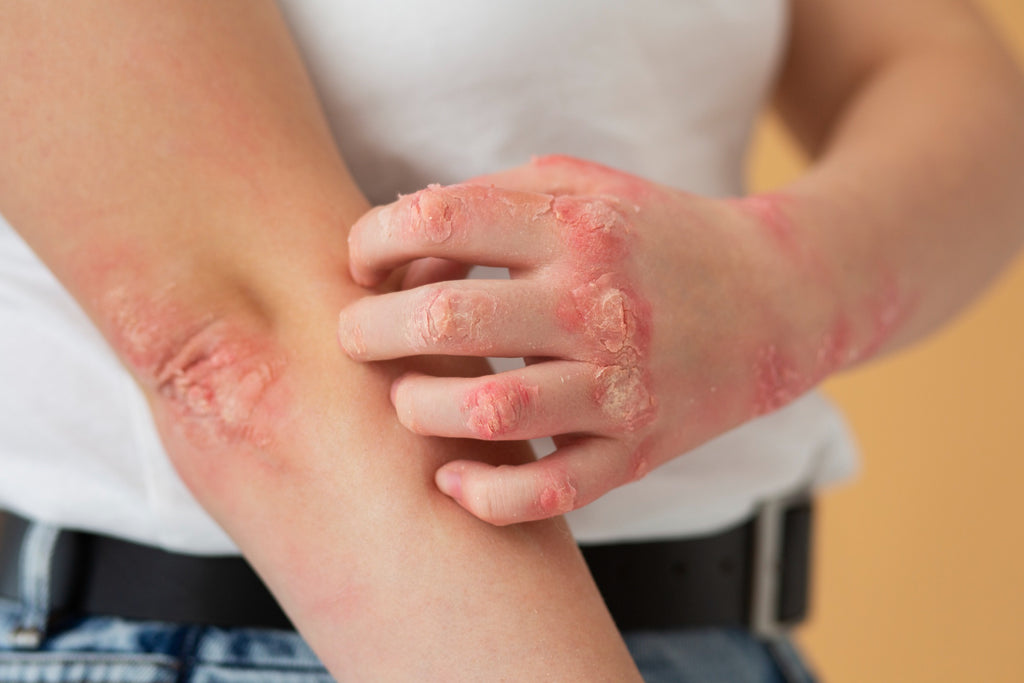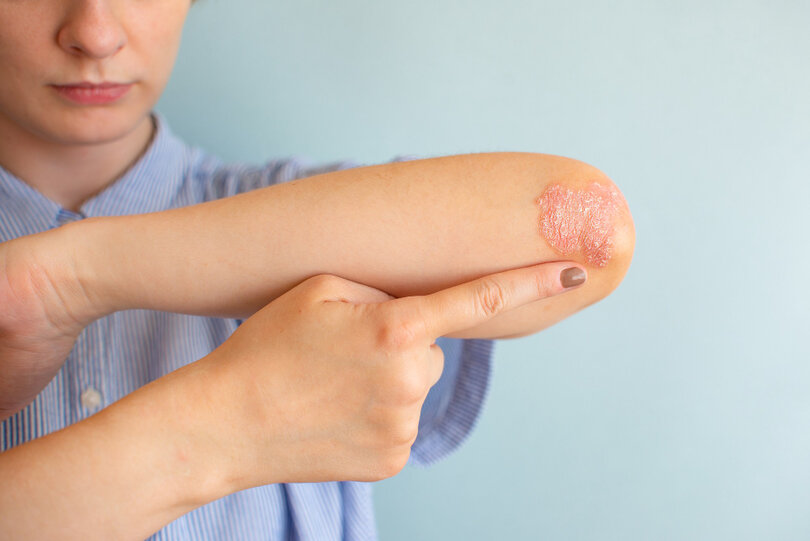Psoriasis is a common chronic skin condition that affects millions of people worldwide. It is characterized by red, inflamed patches of skin covered with silvery-white scales or plaques. Patients with psoriasis often experience itching, burning pain, discomfort, and peeling of the skin. In severe cases, psoriasis can cause skin infections, arthritis, and other complications. In this comprehensive guide, we will explore the different types of psoriasis, its causes, triggers, diagnosis, and available treatment options.
Types of Psoriasis

Psoriasis can manifest in various forms, each with its own distinct characteristics. Understanding the different types of psoriasis is crucial in determining the most effective treatment approach. Here are the most common types of psoriasis:
1. Plaque Psoriasis
Plaque psoriasis is the most prevalent form of the condition. It is characterized by red, inflamed areas of skin covered with silvery-white scales or plaques. These plaques typically appear on the knees, elbows, scalp, and lower back. Plaque psoriasis can cause significant discomfort and self-consciousness due to its visibility.
2. Guttate Psoriasis
Guttate psoriasis presents as small pink spots on the skin. These spots are usually scattered across the trunk, arms, and legs. Unlike plaque psoriasis, the spots in guttate psoriasis are rarely thick or raised above the surface of the skin. This form of psoriasis is commonly triggered by bacterial infections, such as strep throat.
3. Pustular Psoriasis
Pustular psoriasis is characterized by the formation of white, pus-filled blisters on the skin. It predominantly affects adults and is typically limited to smaller areas, such as the hands or feet. However, it can still spread to larger areas of the body. Pustular psoriasis can be painful and may cause fever and severe illness in some cases.
4. Inverse Psoriasis
Inverse psoriasis appears as inflamed, bright red patches of skin in areas with skin folds, such as the armpits, groin, breasts, or genital area. The skin affected by inverse psoriasis often has a shiny, smooth appearance. This type of psoriasis is particularly uncomfortable due to the sensitivity of the affected areas.
5. Erythrodermic Psoriasis
Erythrodermic psoriasis is a severe and potentially life-threatening form of psoriasis. It causes widespread redness and inflammation, giving the appearance of a severe sunburn. The affected areas of skin often peel off in large patches. Patients with erythrodermic psoriasis may also experience fever and severe illness. Immediate medical attention is essential for this type of psoriasis.
Is Psoriasis Contagious?
One common misconception about psoriasis is that it is contagious. However, psoriasis is not a contagious condition. It cannot be transmitted from person to person through touch or close contact. Touching a part of a psoriasis lesion on someone’s body will not cause the person to contract psoriasis. Psoriasis is a chronic autoimmune skin disease and not an infectious one.
Causes of Psoriasis

The exact cause of psoriasis is still not fully understood. However, research suggests that it is a result of a combination of genetic and environmental factors. Here are the primary causes and risk factors associated with psoriasis:
1. Immune System Dysfunction
Psoriasis is categorized as an autoimmune disease, wherein the immune system mistakenly attacks healthy skin cells. In a normal immune response, white blood cells are deployed to fight off bacteria and infections. In psoriasis, these immune cells cause an overproduction of skin cells, leading to their rapid accumulation and the formation of plaques. The exact trigger for this immune dysfunction is yet to be determined.
2. Genetic Predisposition
Psoriasis has a strong genetic component, with family history being a significant risk factor. If someone in your family has psoriasis, your chances of developing the condition are higher. According to the National Psoriasis Foundation, approximately 2 to 3% of people have hereditary psoriasis.
Psoriasis Triggers
While the exact cause of psoriasis remains elusive, certain triggers can exacerbate or initiate flare-ups in individuals predisposed to the condition. Identifying and managing these triggers can help patients better control their symptoms. Here are some common triggers associated with psoriasis:
1. Alcohol Consumption
Alcoholic beverages, especially those with high alcohol content, have been known to trigger psoriasis flare-ups. Excessive alcohol consumption can lead to increased inflammation and worsen the severity of psoriasis symptoms. It is advisable for individuals with psoriasis to limit their alcohol intake.
2. Medications
Certain medications can trigger or worsen psoriasis in susceptible individuals. Drugs such as lithium (used to treat bipolar disorder), antimalarials, and some blood pressure medications have been associated with psoriasis flare-ups. If you have psoriasis, it is important to inform your healthcare provider about your condition before starting any new medication.
3. Infections
Infections, particularly strep throat, can trigger or exacerbate psoriasis symptoms. When the body is fighting off an infection, the immune system becomes overactive, leading to an increased likelihood of a psoriasis flare-up. It is crucial to promptly treat any infections and maintain good overall health to minimize the risk of psoriasis flare-ups.
Diagnosis of Psoriasis
Diagnosing psoriasis involves a combination of clinical examination and, in some cases, additional tests. Here are the two primary methods used to diagnose psoriasis:
1. Clinical Examination
During a clinical examination, a dermatologist will visually inspect the skin for characteristic signs of psoriasis. It is important to inform the doctor about any family history of psoriasis and provide a comprehensive overview of the symptoms experienced. This information will aid in the accurate diagnosis of the condition.
2. Biopsy Test
In certain cases where the symptoms are unclear or the doctor wants to confirm the diagnosis, a small sample of the patient’s skin may be taken for biopsy. A skin biopsy involves removing a tiny piece of skin for laboratory analysis. This test can help differentiate psoriasis from other skin conditions with similar symptoms.
Treatment Options for Psoriasis
While there is currently no known cure for psoriasis, various treatment options are available to manage the symptoms and improve the quality of life for individuals living with the condition. Treatment approaches are typically tailored to the severity and specific type of psoriasis. Here are the three main types of psoriasis treatment:
1. Topical Drug Treatment
Topical creams and ointments are commonly used to alleviate the symptoms of mild to moderate psoriasis. These medications are applied directly to the affected areas of the skin and can help reduce inflammation, slow down skin cell growth, and remove scales. Some commonly prescribed topical medications for psoriasis include corticosteroids, retinoids, anthralins, vitamin D analogs, and moisturizers.
2. Systemic Medications
Systemic medications are prescribed for individuals with moderate to severe psoriasis or those who have not responded well to topical treatments. These medications work throughout the body to suppress the immune system and reduce inflammation. Examples of systemic medications used to treat psoriasis include methotrexate, immunosuppressants, biologics, and retinoids. The choice of medication depends on various factors, including the patient’s overall health and specific subtype of psoriasis.
3. Phototherapy
Phototherapy, also known as light therapy, utilizes ultraviolet (UV) or natural light to treat psoriasis. Exposure to UV or natural light helps slow down the production of skin cells and reduce inflammation. Phototherapy can be administered in various forms, including narrowband UVB therapy, PUVA (psoralen plus ultraviolet A) therapy, and excimer laser therapy. This treatment option is effective for mild to moderate psoriasis and can be combined with other treatments for better results.

Conclusion
Psoriasis is a chronic skin condition that affects millions of individuals worldwide. It presents in various forms, each with its own distinct characteristics. While the exact cause of psoriasis is still unknown, immune system dysfunction and genetic predisposition are believed to play significant roles. Identifying and managing triggers can help individuals control their symptoms effectively. Accurate diagnosis involves a clinical examination and, if necessary, a skin biopsy. Although there is no cure for psoriasis, various treatment options, including topical medications, systemic medications, and phototherapy, can help manage symptoms and improve the quality of life for those living with the condition. If you suspect you have psoriasis or need personalized medical advice, it is recommended to consult with a healthcare professional for an accurate diagnosis and appropriate treatment plan.
